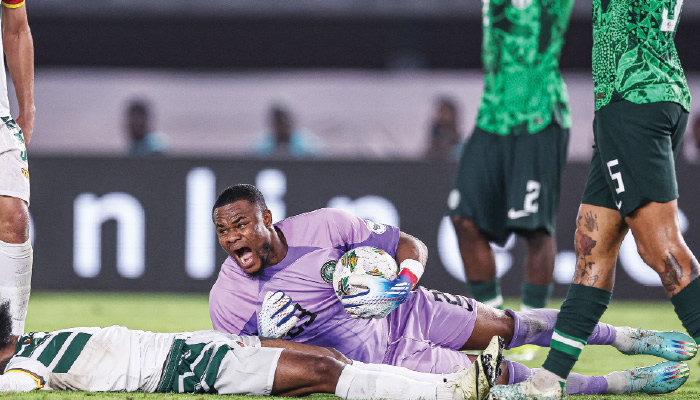Nigeria’s hopes of qualifying for the upcoming World Cup have been dealt a significant setback with the injury of their first-choice goalkeeper, Stanley Nwabali. The 29-year-old suffered the injury during a league match for his South African club, Chippa United, against Richards Bay. Nwabali was stretchered off the field in the first half, clearly in distress, raising concerns about the severity of the injury and his availability for crucial upcoming World Cup qualifying matches against Rwanda and South Africa. The timing of this injury couldn’t be worse for the Super Eagles, as they are already grappling with a goalkeeping crisis due to the suspension of Maduka Okoye for illegal betting activities. This leaves Nigeria with a depleted pool of goalkeepers and a serious challenge in filling the void left by Nwabali.
The importance of Nwabali to the Nigerian national team cannot be overstated. With 21 appearances for the Super Eagles, he has been a dependable presence in goal and a cornerstone of coach Eric Chelle’s defensive strategy. His experience, shot-stopping abilities, and command of the penalty area have provided much-needed stability to the team. His absence will undoubtedly be felt, especially in high-pressure matches against tough opponents like Rwanda and South Africa. The loss of both Nwabali and Okoye leaves a significant gap in experience and leadership within the goalkeeping ranks.
The current options available to coach Chelle present a dilemma. Amas Obasogie, who plays his club football in Tanzania, is uncapped at the international level, lacking the experience needed for such crucial qualifiers. Adebayo Adeleye, while playing for Greek club Volos NPS, has only a single appearance for the Super Eagles, making him a relatively untested option. While both goalkeepers possess potential, throwing them into the deep end against strong opposition in must-win qualifiers carries a considerable risk.
The inclusion of 15-year-old Ebenezer Harcourt in the national team squad adds an interesting dimension to the situation. Harcourt’s impressive performances at the U-20 Africa Cup of Nations earned him a call-up to the senior team, showcasing his undeniable talent. However, relying on such a young and inexperienced goalkeeper in high-stakes World Cup qualifiers would be a significant gamble. While Harcourt represents the future of Nigerian goalkeeping, expecting him to shoulder the responsibility of qualification at this stage of his career seems unrealistic and potentially detrimental to his development.
Nigeria currently sits precariously in fourth place in their qualifying group, trailing leaders South Africa by six points. With only two matches remaining, the Super Eagles face an uphill battle to secure a qualifying spot. The absence of Nwabali further complicates their task, as his experience and leadership will be sorely missed. The team will need to find a solution to their goalkeeping woes quickly and rally together if they hope to overcome the odds and qualify for the World Cup. These next two matches are crucial, and the performance of whoever fills Nwabali’s shoes will likely determine Nigeria’s fate.
The injury to Nwabali highlights the fragility of a team’s fortunes and the impact that unforeseen circumstances can have on even the best-laid plans. It underscores the importance of squad depth and the need for adequate backup options in key positions. For Nigeria, this injury serves as a wake-up call, exposing a vulnerability in the goalkeeping department that needs to be addressed for future tournaments. The upcoming qualifiers will be a test of character for the Super Eagles and an opportunity for other players to step up and prove their worth in the face of adversity. The nation will be watching closely to see how the team responds to this challenge and if they can find a way to overcome the loss of their star goalkeeper.














